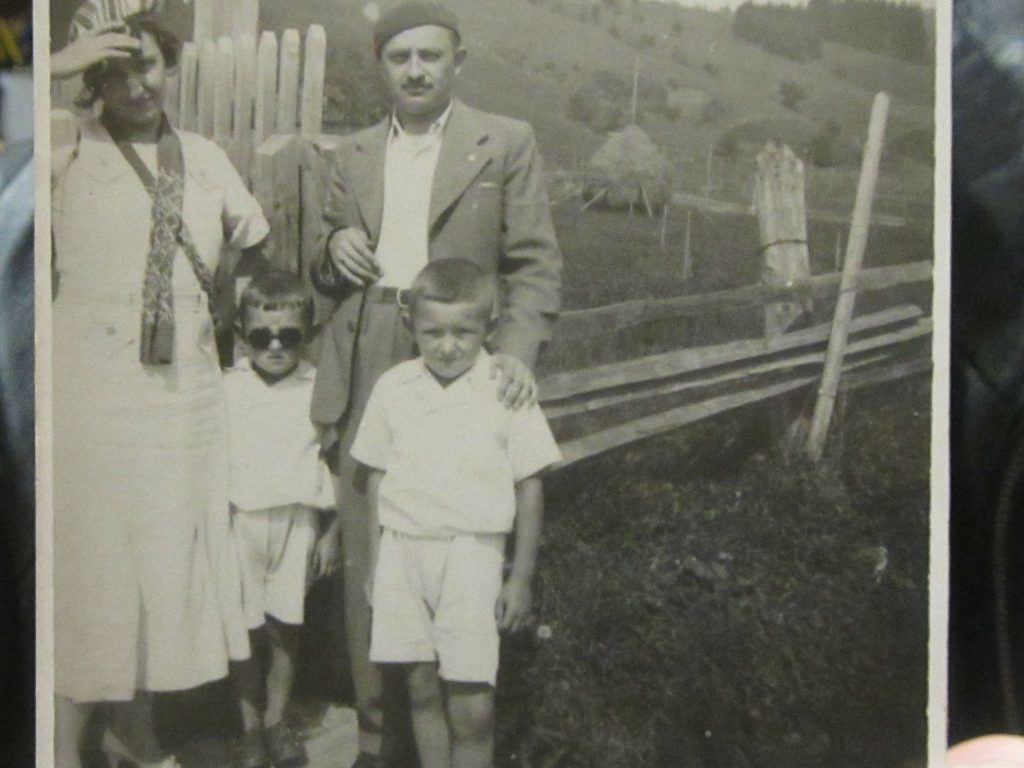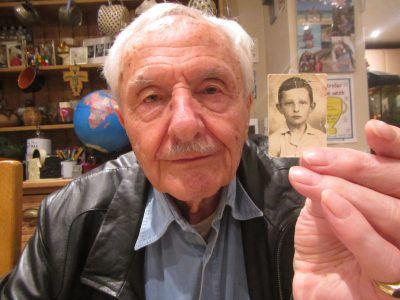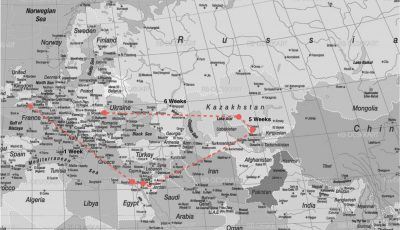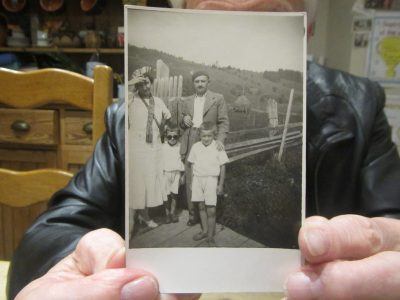Stretch and Challenge
On Wednesday 18th November Upper V students, Grace Lozinski, Franceska Barnard and Serena Gray presented to us the projects they had been working on in ‘Stretch and Challenge’. Stretch and Challenge is a new initiative – an opportunity for pupils to pursue areas of interest, to study and explore in depth a topic of interest which is beyond the curriculum.
Franceska Barnard gave us a fascinating presentation on the pioneers of heart surgery and Serena Gray took us into her family history with the story of her grandfather who, during World War II, was treated by the ground-breaking plastic surgeon, Sir Archibald McIndoe.
The theme of this year at St Augustine’s Priory is courage and here we present Grace Lozinski’s enthralling report on her grandfather, an astonishing story of courage and survival during World War II.
‘Welcome to my stretch and challenge project, based on my Grandfather’s life story.
My grandfather, Zyggy Lozinski, was born in 1929 and he lived a normal life growing up Stanislawow in South East Poland; he is from a wealthy family and he describes his life then as “comfortable.” He went to school like most children, and his father was a banker.
Then when war broke out in 1939 and Nazi Germany attacked Poland from the west his story began.
He told me that many people were worried, and his father believed that he would have to leave the country with the papers and documents from the bank to join the Polish government which was being reconvened in France. Sadly his father’s predictions came true and he was evacuated with everything in late September 1939. As part of the Nazi-Soviet Pact, in September 1939 Russia attacked Poland from the east and occupied Eastern Poland while Germany occupied the Western part.
My grandfather said that life under Russian occupation was very difficult, his school closed down and there was an absence of education until April 1940. Russia was in the process of organising schools under communist education, my grandfather described the changes as “unfamiliar, as it was a different way of life and system of government.”
You would think that being under foreign occupation was difficult enough, but in April 1940 at three o’clock in the morning my grandfather’s life was changed forever. An officer of the secret police accompanied by soldiers knocked on the door, and told his mother, my great-grandmother to pack her things and be ready in three hours as they were going somewhere “not very far away.”
This was the forced resettlement of the Polish population, taken to live in unpopulated areas of Russia. One point one million people were resettled and although this is only a statistic it does give you an indication of the enormous scale of people who were forced to flee their homes. The reason for this resettlement was because the middle classes were considered anti-communist or bourgeois and thus against communism.
My grandfather, his mother and his two siblings were escorted to a railway where they were loaded onto cattle trains fitted with wooden benches and headed for the Polish-Russian border. They travelled for six weeks on these trains, making occasional stops to get hot water. The twelve wagons were packed full of people. One person died on their wagon and was removed and buried with no funeral. There were mostly women, children, and the elderly; men were taken to labour camps, called gulags. The conditions were terrible, the lavatory was a hole in the floor of the carriage.
My grandfather even spoke of one sick, elderly lady who was so cramped and stiff from being stuck in the carriage for so long that she died sitting down in a fixed position. My grandfather’s mother even took on the role as a surrogate parent on the train as both parents of a little boy had died on the journey and he was an orphan. Sadly, they lost track of him as he was sent to an orphanage.
Finally they were all unloaded in an empty railway station in Kazakhstan, in Russia. They waited for four hours and were eventually taken to an almost uninhabited village whose few residents were native Kazakhs who my Grandfather described as a “friendly population.” These Kazakhs had been resettled from their village and so were sympathetic to the plight of the Polish families.
There were many problems in the village from the -35 degree winters to people dying from dysentery. There was no Russian aid as the priority was to take supplies to the front line. Lice infestation was also a big problem. These are things that an 11 year boy should never experience.
The family was allocated a one room hut made from mud and bricks, with a fire and no windows. They shared their tiny room with cow manure as they had to use this for fuel. Can you imagine living in such unhygienic conditions?
My grandfather and his siblings were considered privileged in Poland and had never experienced such primordial lodgings.
The family was told that they were going to work in the wheat fields to help with agriculture and after a few days recovery from their perilous journey they were called to work – which was to get rid of weeds. Their hours were from eight in the morning until six in the evening. The payment for this work was half a kilo of bread.
My grandfather describes his mother as “very intelligent” as she brought her most valuable possessions, such as women’s clothing made from silk and also jewellery. She sold these items to the local people in exchange for eggs, milk, and butter. Unlike 11 year old boys these days, my grandfather was handed a whip and shown oxen and was told to plough the field in exchange for food.
They remained in the village until September 1940. Then my great-grandmother decided to travel to a wheat production centre, where wheat was manufactured. As a trained teacher she took up a position in a laboratory testing wheat. The family’s accommodation was upgraded to a one room flat with a stove for a kitchen, but no internal lavatory and no sewage system. Here the children did go to school but were forced to learn about the “glory of communism.” My grandfather has no photographs from this time as cameras were confiscated as photographs were considered to be the enemy.
When I was interviewing him, my grandfather recalled something that his father told him before he left: “Do not worry my dear family, England will come to rescue Poland and within six months we will be free again and the war will be over.” However, we know that it lasted five years. Unfortunately, my grandfather did not regain contact with his father until 1946.
In June 1941, as Stalin very well knew, Germany attacked Russia and Russia became allied with Great Britain and America who were both allies with Poland. By government decree, all Polish people who were taken to Russia by force and who were prisoners of war were freed and my grandfather and his family were notified that the Polish army was being formed in Russia to go to the Middle East to help the allied army in North Africa fight the Nazis.
When being asked about his reaction to this, he said that they were happy and they managed to get transported to Southern Russia, to a place called Tashkent, where the army was being formed and trained. This train journey lasted five weeks, from the middle of Russia to Southern Russia where the Polish forces were stationed. In order to save children from the harsh conditions in Russia, as supplies were desperately short, the Polish government invited children to join the boys’ and girls’ military units. These units were supplied with British army uniforms, and were considered part of the Polish army.
My grandfather recalled that 1942 was a particularly difficult year for everyone, including the Polish forces. It was a harsh winter and supplies such as food and fuel were short. For the military units, there was strict military discipline and they studied English.
After staying in southern Russia up to July 1942, the Polish army organised transport over the Caspian Sea to Tehran, the capital of Iran, to evacuate the army in transition to the Middle East. This military transport went through Jordan, Iraq and Palestine and my grandfather experienced this long journey when he was just 13. On arrival in Palestine they were housed in military barracks and separated from the girls and women. Here my grandfather enrolled in a school near Gaza from 1943-47, and took part in lessons and military exercises such as military drills and also shooting from when he was 14. Then, in August 1947 they left Palestine and were transported to Port Said in Egypt and embarked on another journey to England. This journey by boat took a week.
When asked about his reaction to the war ending in 1945, he said that everyone was very happy and they all thought that they would be able to safely return home. But in fact this wasn’t possible as Poland was overrun by Russian forces and the communist occupiers stayed in Poland until 1988. My grandfather said “We were very sad not to return home. Our home was given to Russia as an agreement between the powers and we believed this to be unjustified.”
My grandfather’s family were given a choice of places to settle in. They even had a choice to return home. They chose to go to England because they were afraid to go back to Poland as they feared they might find themselves back in Siberia as “undesirable elements.”
Upon arrival in Southampton they went to military camps in Norfolk. After the war 150,000 Poles came over to England, most of whom were soldiers. I asked my grandfather if he could remember any moments of his arrival in England. He said with particular fondness that they were greeted by ladies who gave them tea and cakes.
They stayed in the military barracks for about six months, where my grandfather was lucky enough to be interviewed for a special school to study English Matriculation for 18 months in order to get into university. He said he was grateful to be accepted, as he would then have a chance to succeed in England. For 18 months he worked hard, and studied the English language, Chemistry, Physics and Polish as a foreign language. In 1950 he was 21 and was very fortunate to be able to come to London, and go to London University to study engineering. It took four years of studying to achieve his B.Sc. (Hons). He then started his engineering practice and attained a partnership with a company designing buildings and bridges. He was a professional engineer from 1954 to 2005 – nearly 60 years. Then, in 1955 grandfather married my grandmother.
How does this story relate to the theme of courage – the theme of this academic year at St Augustine’s Priory?
When I first decided to take on this challenge I completely forgot about trying to fit it in with the theme of courage.
But then I realised that every piece of this story links in with this theme. My grandfather, his family and those other hundreds of thousands of people forced out of their homes showed extraordinary resilience and determination to make the best of a terrible situation. As well as being the focus of my project, my grandfather is really the centre of our family; he has such a great personality and has offered me a wealth of knowledge which I have been honoured to share.
It can be said that I have had a slight advantage over other students taking part in the Stretch and Challenge scheme. I had to look no further than my own doorstep for my research as my grandfather lives right across the road from our house. Apart from me having to organise our meetings around his bridge timetable he was always happy to share with me his story although sometimes it was difficult for him to recall some of the events, as they were too painful. However, I was curious to see if there were any similar stories out there and I did a search on the internet and found little if any useful material. This highlighted for me the fact that barely any people of the younger generations would know about events like this. Therefore, I decided to record this story not just for Stretch and Challenge but for the present Lozinski family and other future Lozinskis to look back on and appreciate our heritage and the story’s direct relevance to our existence, as my grandfather won’t be able to tell his story forever.
I believe this story is relevant to us today because of the great number of refugees seeking refuge in Europe, like the Polish people – displaced from their homes and searching for a better future. Although the terms of their departure from their homes are different, these people and my grandfather were all forced from their homes because of war and conflict. We can perhaps come to the conclusion that British attitudes to immigration and refugees have changed from when my grandfather came over to England, as some people are now sceptical of refugees and immigrants alike and view them as economic and social burdens.
I really enjoyed taking part in the Stretch and Challenge scheme, as my area of research complemented my favourite subject, History, as many political events I have studied directly influenced my grandfather’s life. As well as thanking my grandfather for his amazing ability to recall some of these events which took place almost 80 years ago and for giving me a greater appreciation of my history; I would also like to thank Mr Elder because without his initiative in starting this excellent scheme I would never have learnt so much about my own history and become even closer to my grandfather. Alongside Mr Elder, I would like to thank Miss Trybuchowska for supporting me through this project and giving me great advice and sharing her own knowledge with me.’
Thank you, Grace, for this excellent piece of research and to Mr Z Lozinski for sharing his life story with us.
Categories: Senior Whole School




